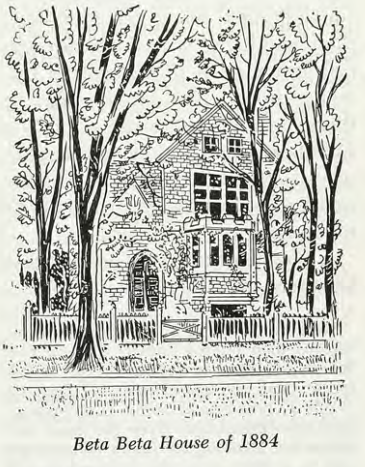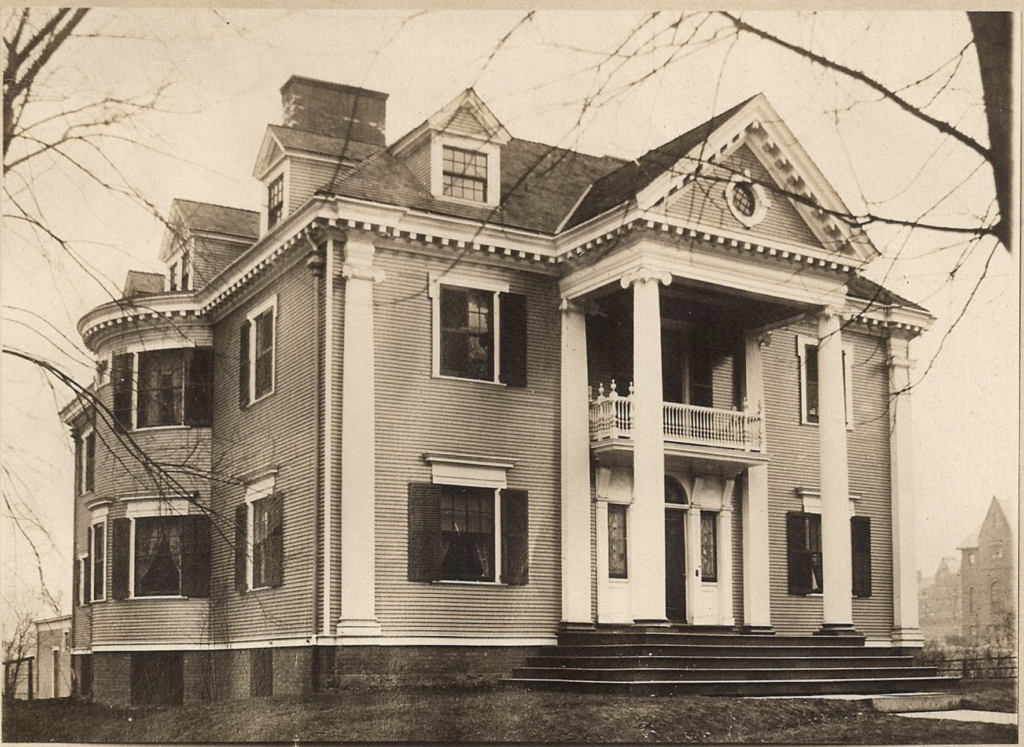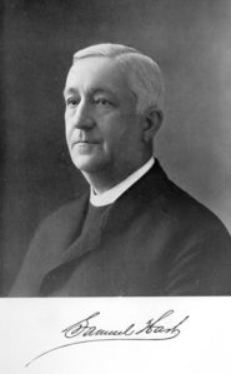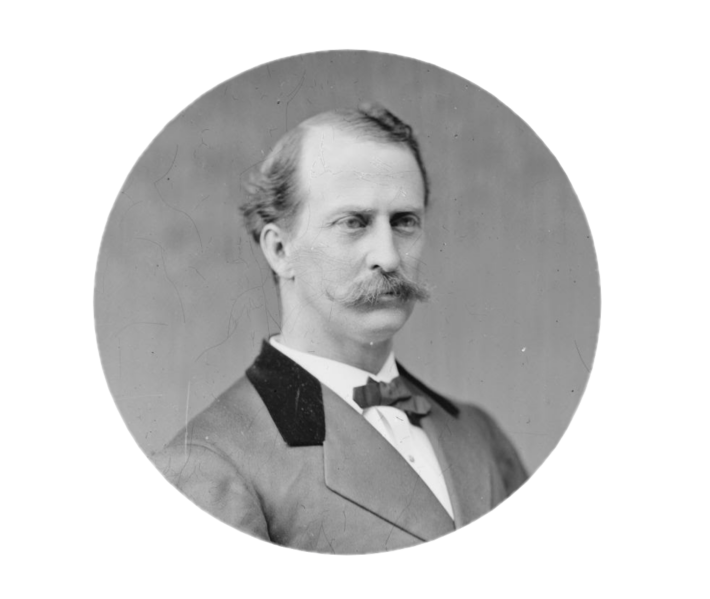History of Our Chapter

Beta Beta Chapter of 1882, containing some of the Charter Members
Less than a decade after the founding of Psi Upsilon, fewer than a dozen serious minded and studious young men met together one night in a dormitory room at Washington College (the name was changed to Trinity College in 1845) in Harford, Connecticut to discuss a matter that had been considered informally by smaller groups on numerous previous occasions—the formation of a society that would perpetuate their ideals down through the years.
This was in 1842 and out of that meeting was born the Beta Beta Society, known as the Black Book, which had concisely set forth the “promotion of scholarship and friendly relations.” In a nucleus of three men, William U. Colt (class of 1844), Thomas S. Preston (class of 1843), and Henry T. Welles (class of 1843), the Beta Beta Society had its origin. With this group and others, the Society started on its honorable and courageous march.
Old records seem to indicate that their meetings were quite boring. Many of them were studying for ordination in the Episcopal Church and were profound students of Latin and Greek. They had as an order of business “literary exercises” when, weekly, one member would read an essay he had written, discuss some classical subject or recite a poem of his own authorship. Although considerably changed in form and content, these literary exercises have come down with each succeeding group of Beta Beta men and today’s frequently discussed topics involve college life, foreign policy, or current events.
Trinity College (or to keep the old name Washington College) was very small in 1842 and was located on the site where the capitol of Connecticut now stands. The Beta Beta Society likewise was small. At first only upperclassmen were eligible for membership, but some few years after its founding freshmen were admitted and initiated if they were considered sufficiently high in intellect to affiliate with an order seriously devoted to scholarly pursuits.
Not many years passed before the Beta Beta took a commanding place on the Trinity campus where its influence in college affairs was distinctly felt. Its members took a prominent part in the undergraduate activities and in the cultural life of the city in which they were not infrequently invited to participate. When Beta Beta was organized there were few chaptered fraternities in the college of America and none at Trinity College.
As the trend towards the chaptered societies in American colleges and universities became more pronounced, the Beta Beta Society appears to have taken full notice. There is ample evidence that indicated they were well informed on contemporary student thought as it related to Greek letter societies, but they appear to have been in no hurry to join the procession. Early chapter minutes reveal that they discussed at considerable length the pros and cons of affiliation with some national society, but several years elapsed between the first mention of the subject and any concrete action leading to formal association.
Then, as now, any sharp departure from the so-called normal or traditional way of life was received by some with no little misgiving. That Beta Beta should give up her individuality was not easily countenanced and the records disclose that the suggestion of affiliation was received with “strong disfavor” by a few but “with approbation by the majority.” In June 1877, the movement towards affiliation with Psi Upsilon was in full swing and not only were active members of the society considering the proposals, but alumni were likewise taking part in the deliberations.
How Beta Beta men felt about consolidation with a fraternity that in the late 1870’s had 17 chapters can perhaps be best portrayed in the following extract from a communication sent to all members of the Society during the time the matter was under consideration (see image):


It is abundantly clear from the above quotation as well as from miscellaneous records in chapter archives that affiliation was no light matter to be entered into without the most sober thought and reflection. But wise Beta Beta men saw the direction in which the tide was running and with equal prudence they discerned that it would be greatly to the advantage of the Society to ride it at the flood.
Both active alumni members of Beta Beta and alumni were made assured that if the changed were made it would not affect the objects of the Society as laid down by the founders; that most of the old customs would be retained; that the traditions of the Order would survive; that the principles would continue and that actually affiliation would “only touch her outward form.”
It was even argued by proponents that the name of Beta Beta would be preserved in the new existence and that while a new pin would of necessity have to be adopted, the old Beta Beta insignia, the two Greek letters encircled with a serpent, would be retained in some form. In other words, everything was done to safeguard the cherished traditions that had developed in the nearly four decades of the Beta Beta Society’s existence.
During the affiliation proposals, the Beta Beta Society of course stipulated in its petition that its alumni should be inducted into Psi Upsilon as well as the active members, and taking cognizance of this point the committee observed:
“The Beta Beta Chapter of Psi Upsilon of Trinity will bring into the living membership of our Order a large number of active professional gentlemen of prominence than we should be likely to secure from that college in the next twenty-five years, were we simply to grant a charter to its undergraduate classes, and have them organize de novo.”
Before this, in 1872, several graduate members of the Society had organized the Colt Trust Association named in honor of Rev. William U. Colt, one of the founders of the Order. This Association was formed to give the Society a continuing medium for the holding of real property or trust funds then owned or that might at some future time come into its possession. The Association still exists and continues to perform the functions outlined by its incorporators.
So well satisfied was the Committee with the conditions and unusually sound financial position of the Society that, after a thorough investigation of the entire proposal, it not only urged the Executive Council and the several Chapters to approve admittance of Beta Beta but to do it with “prompt and speedy action.”
The Council in routine manner formally notified the several Chapters of the special committee’s report and in the interim between Chapter action and final acceptance a flood of indorsements swept forward in Beta Beta’s favor. One example of these is a letter in November, 1879 from the distinguished Charles W. Smiley (Xi Chapter 1874), of the Smithsonian Institution, written to the Omega:
“It is as if by some means of our oldest and best chapters was outside and asking admittance. Put the record of Beta Beta beside any of our oldest chapters and I believe it is up to ours. Here is Beta Beta, graduates and undergraduates offering us the united fruit of their forty years toil, and their united allegiance, and their united pledges of the same kind of work for Psi U. None came asking honorary membership in Psi U but they ask us to put the seal of our honored name on their work.”
The formal exercises were held in the Beta Beta chapter hall at 7 o’clock on the night of February 5, 1880, the thirty ninth anniversary of the founding of the Beta Beta, followed by an elaborate inauguration banquet at the Allyn House Hotel, attended by more than one hundred and fifty members of Psi Upsilon not only from Hartford and vicinity but from as far distant as Detroit, St. Louis, and Rochester.
Newspaper reports of the affair state that trains arriving throughout the day bore large groups bound for the ceremonies. The Governor of Connecticut, himself a member of the Fraternity, was to be an honored guest, but illness prevented his attendance. The list of those present reveals, however, that scores prominent in the official, professional, business, industrial and social life of their communities came to Hartford for the induction. More than half of the Chapters were represented by especially appointed undergraduate delegates.
In the summer of 1884, the Beta Beta Chapter was completing what was described in the local press as “one of the finest and most attractive secret society buildings connected with any New England college.” The imposing new Chapter house located at Washington and Park Streets was ready for occupancy in the fall of that year. Washington Street (first building shown in video was old Beta Beta house) particularly was, in the 1880’s and 90’s as well into the early years of the 20th century, a thoroughfare along which some of the most distinguished residences in Hartford were located. Names outstanding in the social, business and political life of the city and state were listed among those whose beautiful old New England homesteads were half hidden behind more than a mile of gigantic elm trees.

In the early days long before the automobile took over the highways, sleigh racing in the winter was a popular sport along Washington Street, the pacers starting in the vicinity of the Beta Beta House and running their course straight down the broad highway to the State Capitol grounds where the college formerly stood. Not infrequently in those now distant winters did the Beta Beta men stand along the roadway to cheer their favorites in exciting contests between Hartford’s top ranking thoroughbreds.
In the present Beta Beta Chapter House, the stone diamond shaped emblem is still preserved as a memento of the House in which so many of the cherished traditions were born. The structure has long since given up the struggle of encroaching commerce and where college boys once sat beneath the trees in pleasant relaxation, motorists now honk in impatient demand for gasoline and oil.
For more than twenty years the Chapter occupied this building but as the college grew and the Fraternity grew with it, the feeling became pronounced that Washington Street was beginning to lose its residential character and that the location was too distant. Time likewise brought changes in viewpoints and students voiced objections to the long walk, especially during the cold winter months. The desirability of a new home adjacent to the campus began to take definite form—something more than mere wishful thinking and fond hope. Undergraduates approached alumni about the problem, with the result that in February 1902, the Beta Beta chapter purchased its present quarters at 81 Vernon Street, a fourteen-room colonial house, one of the showplaces of its day and retaining down to the present time all the old charm and distinctiveness that has endeared it to hundreds of Psi U men who have entered its friendly portals. For many years the front door was never locked and one late summer in the late 1930’s when the House, for the first time in more than a decade, was untenanted during the summer, no key could be found to lock up the doors for the year’s end.

In May 1910, fire swept from the basement of the elevator shaft through to the roof and only because it occurred in mid-day was a serious loss averted. Many older residents of the vicinity recalled the fire with considerable amusement, for their recollection is that a group of shouting college boys were throwing their belongings from the second-floor windows while firemen struggled to get ladders and hose to the roof. Actual structural damage was limited to less than $2,000 dollars, but the event was far and away the high point in the college year for the Chapter. The House has gone through periodic renovations and refurnishing to keep it comfortable and homelike, as well as to provide a center about which fraternity life can revolve completely satisfying to those who occupy it.
Reference has already been made here to the strong tradition upon Beta Beta men of the early days, so clearly emphasized in the insistence upon continuation of these hallowed customs by those who participate in the negotiations leading to affiliation with Psi Upsilon. With the passing years there appears to have been no diminution in this watchful guardship of the familiar and beloved ties that loom so large in the hearts of Beta Beta men.
An example in point is suggestions made in 1916 regarding the adoption of a uniform initiation ceremony. The chapter discussed the proposition at some length and there was considerable agreement that undoubtedly a uniform ceremony would have many advantages. To this day, the initiation ceremony persists.
The chapter’s contribution to the College has been far more than any numerical strength. In campus affairs, in literary and athletic effort of every nature, its active members have always played their part and more. On the Trinity College Board of Trustees, Psi U’s have been conspicuous in numbers, in generosity and in quality of service. At alumni gatherings, no fraternity is represented as is the loyalty and activity of interest in their College of those who wear the symbol of the clasped hands. It was a Beta Beta, Augustus P. Burgwin (class of 1882), who wrote the College anthem, “Neath the Elms.”
It is with some hesitation that we assume the responsibility of selecting Beta Beta’s sons for special mention. Each one has contributed in his own way to the Chapter and in later life has enhanced his profession or calling to the degree that his natural talents or fortunate circumstances permitted, and the strengths of the chapter, in the college and the fraternity, has perhaps lain rather in character than in distinction of individual attainment.
Beta Beta class of 1866 Rev. Dr. Samuel “Sammy” Hart (pictured) probably stands out above all others. For more than half a century, he was intimately and actively associated with all phases of the Chapter’s life. A distinguished classical scholar and eminent teacher, Custodian of the Book of Common Prayer, vice dean and subsequently dean of Berkeley Divinity School at Middletown, Connecticut, from 1899 to his death in 1917, Dr. Hart without question had a more profound influence on the young men who passed through the Chapter during his many years of his close association with it than any other single individual.
Not a few of the graduates have become outstanding physicians and surgeons in their communities, but among those of national fame may be mentioned Thomas L Stedman (class of 1874), editor of the “Medical Record,” linguist, author and contributor to medical publications and lay magazines, and Jerome P. Webster (class of 1910), (son of the Rev. Lorin Webster class of 1880) headmaster of Holderness School, both of New York. Dr. Webster, athlete, sculptor, surgeon, inspector of German prison camps for the United States Ambassador at Berlin before our entry into the first World War, has been decorated by Great Britain, France, and China.

In the field of law, many Beta Beta men had distinguished themselves at the bar, none had the record of Joseph Buffington (class of 1875) of Pittsburgh, PA. Appointed presiding judge of the United States Court of Appeals for the Third District in 1906, he was the oldest federal judge in point of service at the time of his retirement from the bench in May 1938.
William Hamersley (class of 1858), of Hartford, was for twenty years Hartford Country State’s attorney, subsequently judge of the Superior Court, and in 1894 appointed an associate justice of the Connecticut Supreme Court of Errors, where he served until 1908.
Justice Philip J. McCook (class of 1895) of New York State Supreme Court, has likewise had a distinguished career on the bench and, through participation in celebrated cases, has gained national attention for his fearless and impartial decisions. In the World War, as a major in the A.E.F, he was wounded and decorated with the D.S.C.

In the fields of business, finance, and insurance industry, scores of Beta Beta men have risen to high places. Trinity’s imposing of new chapel, one of the finest in the country, and erected at a cost of approximately $2,000,000 was a gift of William Gwinn Mather (class of 1877). A national leader in the public utility field, Samuel Ferguson (class of 1896), son of the Rev. Henry Ferguson (class of 1868), formerly headmaster of St. Paul’s School and later a member of the Trinity faculty, was the head of the Hartford Electric Light Company and was recognized as one of the most progressive executives in the industry. Lawson Purdy (class of 1884) of New York City was widely known as a taxation expert, long identified with outstanding social movements and president of the Russell Sage Foundation.
In science, chemistry, and engineering scores of Beta Beta men have taken prominent places. Woolsey McAlpine Johnson (class of 1898) did outstanding work in metallurgic processes for operating zinc smelters. Ernest DeKoven Leffingwell (class of 1895) was a celebrated Artic Explorer of the early century; and Richard S. Barthelmess (class of 1917) was one of the stars of the silent days of motion pictures.
In the wars of the nation Beta Beta men have been distinguished for their services with the land, air, and sea forces, since Brigadier General Strong Vincent (class of 1858), at age 26, gave his life for the Union at Little Round Top in Gettysburg. In 1917-18 only two members of the active chapter were unable to don the uniform. In 1941 a number had volunteered for service and gone to camp before the end of the college term.
From the pen of Beta Beta men have come many of the Psi Upsilon Fraternity’s songs— “Festival Song,” written by Edward M. Gallaudet (class of 1856) and “Unchanging Psi U.,” by Prosser H. Frye (class of 1889) to name but a few.
Now Beta Beta stands on years of existence, enriched and strengthened by its long tradition. Looking backward one sees the legions of men who have served well their neighbors, their state and their nation. It is in these ranks that coming generations will find their places, and in the days ahead the Beta Beta Chapter will not waver from the course on which it embarked with such high purpose so long ago.

Note: Most of the History of the Beta Beta Society is taken from Annuals of Psi Upsilon, cited below. We encourage you to check it out and learn about the storied histories of other Psi Upsilon chapters.
“GaBauer, Peter A. Babst, Earl D. Annals of Psi Upsilon, 1833-1941. Psi Upsilon Fraternity, 1941, 1941.”
